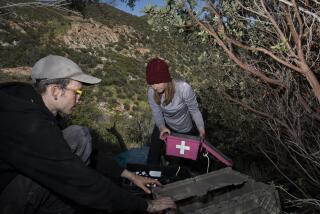Border activist’s littering conviction is overturned
A federal appeals court on Thursday overturned the littering conviction of an Arizona activist who left gallon-size bottles of water for illegal immigrants crossing into the United States through a desert wildlife preserve.
Daniel Millis of NoMoreDeaths.org had been convicted of violating a statute prohibiting the dumping of garbage in an area designated as a refuge for endangered species.
In a 2-1 ruling, judges of the U.S. 9th Circuit Court of Appeals said water didn’t meet the definition of waste. They also took note of Millis’ practice of removing empty water bottles he found while on his missions to avert dehydration deaths in the Buenos Aires National Wildlife Refuge.
Two U.S. Fish and Wildlife Service officers stopped Millis and three other activists Feb. 22, 2008. Officer Allen Kirkpatrick spotted the plastic water bottles in the back of Millis’ SUV and, upon learning that the occupants had placed other bottles along the trails, cited him for “dumping of waste.”
At Millis’ trial before an Arizona magistrate judge, Kirkpatrick testified that litter problems had placed the Buenos Aires refuge on a list of the 10 most imperiled wildlife sanctuaries in the country. He also told the court that the refuge southwest of Tucson was the last U.S. habitat for the masked bobwhite quail and other endangered plant and animal species.
Millis admitted that he had placed the water bottles in the refuge but defended his actions, saying “humanitarian aide is never a crime.”
Millis and two other activists were prosecuted “because of a highly politicized decision by the Department of Justice under the Bush administration to shut these people down,” said William G. Walker, the Tucson attorney who represented all three men.
Charges against the one of the activists were dismissed by a federal judge, and the community service sentence meted out to the other activist after his conviction was stayed pending appeal of Millis’ case, Walker said.
“I would hope that with the realization that they’ve lost three of these cases in a row that they will let these people do their humanitarian work,” Walker said of the government prosecutions.
Two appointees of President Clinton, Judges Sidney R. Thomas and M. Margaret McKeown, made up the panel majority, with Judge Jay S. Bybee dissenting. Bybee, named to the court by President George W. Bush, argued that water bottles were clearly refuse.
Millis, an organizer for the Sierra Club, said he felt more sadness than vindication from the appeals court ruling.
“The day we change our federal border policies to show respect for human life is the day I’ll feel vindicated,” the Tucson resident said.
More to Read
Sign up for Essential California
The most important California stories and recommendations in your inbox every morning.
You may occasionally receive promotional content from the Los Angeles Times.











